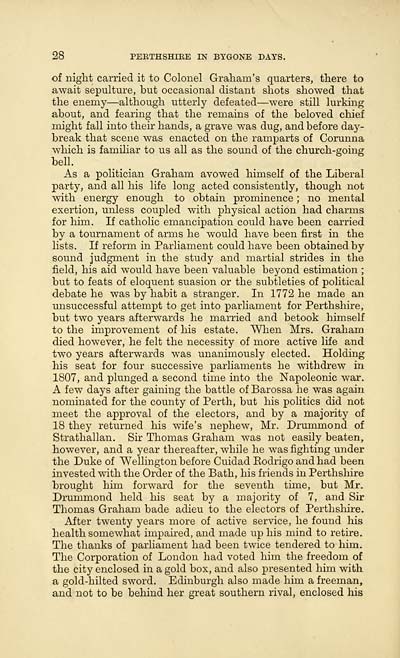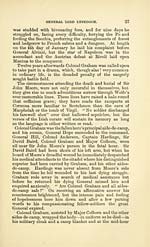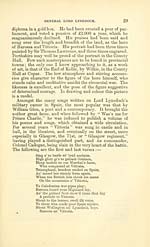Perthshire in bygone days
(56) Page 28
Download files
Complete book:
Individual page:
Thumbnail gallery: Grid view | List view

28 PEETHSHIRE IN BYGONE DATS.
of night carried it to Colonel Graham's quarters, there to
await sepulture, but occasional distant shots showed that
the enemy — although utterly defeated — were still lurking
about, and fearing that the remains of the beloved chief
might fall into their hands, a grave was dug, and before day-
break that scene was enacted on the ramparts of Corunna
which is familiar to us all as the sound of the church-going
bell.
As a politician Graham avowed himself of the Liberal
party, and all his life long acted consistently, though not
with energy enough to obtain prominence ; no mental
exertion, unless coupled with physical action had charms
for him. If catholic emancipation could have been carried
by a tournament of arms he would have been first in the
lists. If reform in Parliament could have been obtained by
sound judgment in the study and martial strides in the
field, his aid would have been valuable beyond estimation ;
but to feats of eloquent suasion or the subtleties of political
debate he was by habit a stranger. In 1772 he made an
unsuccessful attempt to get into parliament for Perthshire,
but two years afterwards he married and betook himself
to the improvement of his estate. When Mrs. Graham
died however, he felt the necessity of more active life and
two years afterwards was unanimously elected. Holding
his seat for four successive parliaments he withdrew in
1807, and plunged a second time into the Napoleonic war.
A few days after gaining the battle of Barossa he was again
nominated for the county of Perth, but his politics did not
meet the approval of the electors, and by a majority of
18 they returned his wife's nephew, Mr. Drummond of
Strathallan. Sir Thomas Graham was not easily beaten,
however, and a year thereafter, while he was fighting under
the Duke of "Wellington before Cuidad Eodrigo and had been
invested with the Order of the Bath, his friends in Perthshire
brought him forward for the seventh time, but Mr.
Drummond held his seat by a majority of 7, and Sir
Thomas Graham bade adieu to the electors of Perthshire.
After twenty years more of active service, he found his
health somewhat impaired, and made up his mind to retire.
The thanks of parliament had been twice tendered to him.
The Corporation of London had voted him the freedom of
the city enclosed in a gold box, and also presented him with
a gold-hilted sword. Edinburgh also made him a freeman,
and not to be behind her great southern rival, enclosed his
of night carried it to Colonel Graham's quarters, there to
await sepulture, but occasional distant shots showed that
the enemy — although utterly defeated — were still lurking
about, and fearing that the remains of the beloved chief
might fall into their hands, a grave was dug, and before day-
break that scene was enacted on the ramparts of Corunna
which is familiar to us all as the sound of the church-going
bell.
As a politician Graham avowed himself of the Liberal
party, and all his life long acted consistently, though not
with energy enough to obtain prominence ; no mental
exertion, unless coupled with physical action had charms
for him. If catholic emancipation could have been carried
by a tournament of arms he would have been first in the
lists. If reform in Parliament could have been obtained by
sound judgment in the study and martial strides in the
field, his aid would have been valuable beyond estimation ;
but to feats of eloquent suasion or the subtleties of political
debate he was by habit a stranger. In 1772 he made an
unsuccessful attempt to get into parliament for Perthshire,
but two years afterwards he married and betook himself
to the improvement of his estate. When Mrs. Graham
died however, he felt the necessity of more active life and
two years afterwards was unanimously elected. Holding
his seat for four successive parliaments he withdrew in
1807, and plunged a second time into the Napoleonic war.
A few days after gaining the battle of Barossa he was again
nominated for the county of Perth, but his politics did not
meet the approval of the electors, and by a majority of
18 they returned his wife's nephew, Mr. Drummond of
Strathallan. Sir Thomas Graham was not easily beaten,
however, and a year thereafter, while he was fighting under
the Duke of "Wellington before Cuidad Eodrigo and had been
invested with the Order of the Bath, his friends in Perthshire
brought him forward for the seventh time, but Mr.
Drummond held his seat by a majority of 7, and Sir
Thomas Graham bade adieu to the electors of Perthshire.
After twenty years more of active service, he found his
health somewhat impaired, and made up his mind to retire.
The thanks of parliament had been twice tendered to him.
The Corporation of London had voted him the freedom of
the city enclosed in a gold box, and also presented him with
a gold-hilted sword. Edinburgh also made him a freeman,
and not to be behind her great southern rival, enclosed his
Set display mode to:
![]() Universal Viewer |
Universal Viewer | ![]() Mirador |
Large image | Transcription
Mirador |
Large image | Transcription
Images and transcriptions on this page, including medium image downloads, may be used under the Creative Commons Attribution 4.0 International Licence unless otherwise stated. ![]()
| Histories of Scottish families > Perthshire in bygone days > (56) Page 28 |
|---|
| Permanent URL | https://digital.nls.uk/94907070 |
|---|
| Description | A selection of almost 400 printed items relating to the history of Scottish families, mostly dating from the 19th and early 20th centuries. Includes memoirs, genealogies and clan histories, with a few produced by emigrant families. The earliest family history goes back to AD 916. |
|---|

